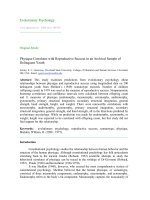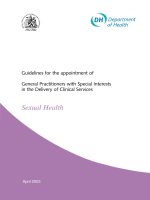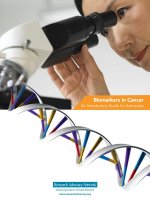Colorectal Cancer: Six Years of Research Progress pdf
Bạn đang xem bản rút gọn của tài liệu. Xem và tải ngay bản đầy đủ của tài liệu tại đây (1.22 MB, 55 trang )
Colorectal Cancer:
Six Years of Research Progress
March 2008
National Institutes of Health
HEALTH AND HUMAN SERVICES
U.S. DEPARTMENT OF
National Cancer Institute
Colorectal Cancer:
Six Years of Research Progress
TableofContents
HIGHLIGHTSOFNCI’SRECENTPROGRESSINCOLORECTALCANCER III
THECOLORECTALCANCERBURDEN 1
NCI
PLANNINGFORCOLORECTALCANCERRESEARCH 5
NCI’
SINVESTMENTINCOLORECTALCANCERRESEARCH 7
NCIFundingforColorectalCancerResearch 7
ResearchProjects 9
ClinicalTrials 11
SpecializedProgramsofResearchExcellence 12
Publications 13
NCI’SPROGRESSINCOLORECTALCANCERRESEARCH 14
Biology 14
ResearchProjects 14
Initiatives 15
ResearchHighlights 17
Etiology 19
ResearchProjects 19
ClinicalTrials 21
Initiatives 22
ResearchHighlights 23
Prevention 25
ResearchProjects 25
ClinicalTrials 26
Initiatives 27
ResearchHighlights 29
EarlyDetectionandDiagnosis 31
ResearchProjects 31
ClinicalTrials 32
Initiatives 33
ResearchHighlights 35
TreatmentandPrognosis 37
ResearchProjects 37
ClinicalTrials 39
Initiatives 40
ResearchHighlights 42
CancerControl,Survivorship,andOutcomes 44
ResearchProjects 44
ClinicalTrials 46
Initiatives 47
ResearchHighlights 49
i
ListofFigures
Figure1.ColorectalCancerEstimatedNewCasesandDeathsbyYear,1999to2008 1
Figure2.ColorectalCancerIncidenceRateTrendsbyRacial/EthnicGroup,1984to2004 2
Figure3.ColorectalCancerMale–FemaleIncidenceRateTrends,1984to2004 2
Figure4.ColorectalCancerMortalityRateTrends(AllRaces),198 4to2004 3
Figure5.ColorectalCancerMale–FemaleMortalityRateTrends,1984to2004 3
Figure6.TrendsinColorectalCancerScreening(FOBTandEndoscopy),1987to2005 4
Figure7.TrendsinNCIFundingforColorectalCancerResearch,FY2000toFY2006 7
Figure8.EstimatedFundingforExtramuralResearchbyScientificArea,FY2000to
FY2006 8
Figure9.TotalNumberofNCI‐SponsoredResearchProjectsRelevanttoColorectal
Cancer,FY2000toFY2006 9
Figure10.ColorectalCancerResearchbyPRGCategory,FY2000toFY2006 10
Figure11.NCI‐SponsoredColorectalCancerClinicalTrialsActiveDuringFY2000to
FY2006 11
Figure12.EstimatedNumberofScientificArticlesonColorectalCancerResearch
AcknowledgingNCISupport,2000to2006 13
Figure13.NCIProjectsRelatedtoColorectalCancerBiology,FY2000toFY2006 14
Figure14.NCIProjectsRelatedtoColorectalCancerEtiology,FY2000toFY2006 20
Figure15.NCIClinicalTrialsRelatedtoColorectalCancerEtiology,FY2000toFY2006 21
Figure16.NCIProjectsRelatedtoColorectalCancerPrevention,FY2000toFY2006 25
Figure17.NCIClinicalTrialsRelatedtoColorectalCancerPrevention,FY2000toFY2006 26
Figure18.NCIProjectsRelatedtoColorectalCancerEarlyDetectionandDiagnosis,
FY2000toFY2006 31
Figure19.NCIClinicalTrialsRelatedtoColorectalCancerEarlyDetectionandDiagnosis,
FY2000toFY2006 32
Figure20.NCIProjectsRelatedtoColorectalCancerTreatmentandPrognosis,FY2000
toFY2006 38
Figure21.NCIClinicalTrialsRelatedtoColorectalCancerTreatmentandPrognosis,
FY2000toFY2006 39
Figure22.NCIProjectsRelatedtoColorectalCancerControl,Survivorship,and
Outcomes,FY2000toFY2006 45
Figure23.NCIClinicalTrialsRelatedtoColorectalCancerControl,Survivorship,and
Outcomes,FY2000toFY2006 46
ListofTables
Table1.RecommendationsoftheColorectalCancerPRG 5
Table2.GastrointestinalSPOREGrantswithColorectalCancer‐RelevantProjects 12
ii
H ighlightsofNCI’sRecentProgressin
ColorectalCancer
WhatNCIFoundWhyNCIPerformedThis
Analysis
Background
In2000,theNationalCancerInstitute
(NCI)convenedamultidisciplinary
committeeofscientists,clinicians,and
advocates—theColorectalCancer
ProgressReviewGroup(PRG)—to
reviewthecolorectalcancerresearch
fieldandmakerecommendations
concerningthemosturgentneedsand
promisingdirectionsforfutureNCI
investment.ThePRG’sreport,
ConqueringColorectalCancer:A
BlueprintfortheFuture,wasissuedin
April2000andprovidedpriority
recommendationsinsixmajorareas:
• Biology
• Etiology
• Prevention
• EarlyDetection&Diagnosis
• Treatment&Prognosis
• CancerControl,Survivorship&
Outcomes
Recommendationswerealsomadefor
thefollowingoverarchingareas:
• Genetics
• Environment&Lifestyle
• PartnershipPlatforms
• Imaging
• BehavioralandHealthServices
Research
Approach
Thisretrospectiveanalysisperformed
in2008addressedmeasuresof
progresssuchastrendsinnumbersof
NCI‐fundedcolorectalcancerresearch
projects,publications,initiatives,and
clinicaltrials.
Results
Duringthepast6years,NCIfundingfor
colorectalcancerincreasedbyalmost
40%.Thenumberofcolorectalcancer
researchprojectsgrewsubstantiallyin
allofthePRGpriorityareas.
AnanalysisofNCI’s6‐yearprogressincolorectalcancerfoundthat:
• Sincethe2000ColorectalCancerPRGreportwaspublished,NCI’sinvestmentin
colorectalcancergrewby39%,from$175.8millionto$244.1million.
Progresswasalsomadeinthefollowingoverarchingareas:
NumberofResearch
Projects
1
(FY2000–FY2006)
550Projects 706Projects
↑28%
NumberofInvestigators
withNCI‐FundedR01Grants
(FY2000–FY2006)
249Investigators 331Investigators
↑33%
NumberofScientificArticles
AcknowledgingNCISupport
(CY2000–CY2006)
424Articles 598Articles
↑41%
1
Researchprojectsincludedinthisanalysishad25%orgreaterrelevancetocolorectalcancer.Projects
supportedbyU10orP30fundingmechanismsandsubprojectsofZ01orP50SpecializedProgramof
ResearchExcellence(SPORE)programsarenotincludedintheprojectcounts.
iii
ColorectalCancerResearchProjects
ResearchProjectsAddressingPriorityAreasDefined bytheColorectalCancerPRGIncreasedbetween
FY2000andFY2006
AdditionalNCIActivitiestoAdvanceColorectalCancerResearch
ClinicalTrials:BetweenFY2000andFY2006,160NCI‐sponsoredclinicaltrialsrelevanttocolorectalcancerwereactive.The
majorityofthesearetreatmenttrialsandmostareeitherPhaseIorPhaseIItrials.
SpecializedProgramsofResearchExcellence:NCIcurrentlysupportsfiveSPOREsingastrointestinalcancerswith
colorectalcancercomponents.
ResearchHighlights
Biology
• Morethan200geneshavebeenidentifiedthatareimplicatedinbreastandcolorectalcancers.
• Asubsetofepithelialcellshasbeenidentifiedthatfunctionascolorectalcancerstemcells.
Etiology
• AbnormalactivationoftheIGF2geneisassociatedwithahereditaryriskforcolorectalcancer,butitisnot
associatedwithanyknownenvironmentalriskfactorsforthisdisease.
• PeoplewithelevatedlevelsofC‐reactiveprotein,amarkerofinflammation,aremorethantwiceaslikelyto
developcolorectalcanceraspeoplewhohavenormalplasmalevelsofthisprotein.
Prevention
• Statins,lipid‐reducingdrugsthatarefrequentlyprescribedtotreatcardiovasculardisease,areeffectivefor
chemopreventionofcolorectalcancer.
• Theriskofdevelopingcolorectalcancerisnotreducedbyfolicacid,dietaryfiber,orthecombinationof
calciumplusvitaminD.
EarlyDetection
&Diagnosis
• StoolassaysofselectedDNAalterationshaveshownhighsensitivityforcancer(57%–91%)andadenomas.
• ResearchhasresultedinrefinedcriteriafordiagnosingLynchsyndrome,alsoknownashereditary
nonpolyposiscolorectalcancer.Thesecriteriaincludethelevelofmicrosatelliteinstabilityintumorsaswell
asotherfactorssuchasage,familyhistoryofthedisease,geneticanalysis,andthebiochemicalproperties
ofdetectedtumors.
Treatment&
Prognosis
• PatientswithmetastaticcolorectalcancerwhoreceivedtheexperimentalFOLFOX4drugregimen
(5‐fluorouracil/leucovorin/oxaliplatin)livedmonthslongerthanthosereceivingstandardchemotherapy.
• Comparedtostandardsurgicalresection,multivisceralresectionforcolorectalcancertreatmentresultsin
betteroverallsurvival.
Cancer
Control,
Survivorship&
Outcomes
• Patientswhoparticipatedinregularphysicalactivityafterbeingdiagnosedwithearly‐to‐laterstage
colorectalcancerreducedtheirlikelihoodofcancerrecurrenceandmortalityby40%–50%ormore.
• Theriskofdevelopingadvancedcolorectalcanceratayoungerageishigherinmalesandinpeoplewho
smokeordrink.
iv
THE COLORECTAL CANCER BURDEN
Colorectal cancer is the third most common cancer in the United States among both men and
women and accounts for nearly 10% of all cancer deaths. In 2008,
1
an estimated 153,880
individuals will be diagnosed with colorectal cancer, and an estimated 50,640 deaths will occur as
a result of this disease. The total number of estimated colorectal cancer cases has increased since
1999 while the number of estimated deaths from this disease has declined slightly in this time
(Figure 1).
Figure 1. Colorectal Cancer Estimated New Cases and Deaths by Year, 1999 to 2008
Source: American Cancer Society: Cancer Facts and Figures 1999–2008
Available at: />
The overall incidence rate for colorectal cancer has decreased slightly over the past 20 years
(Figure 2). Most of this observed decrease reflects lower incidence among whites. Hispanics and
Asians/Pacific Islanders are less likely to develop colorectal cancer than blacks or whites, and
overall incidence rates in these populations have not changed significantly in recent years. Note
that incidence rates are only available for Hispanics, Asians/Pacific Islanders, and American
Indians/Alaska Natives from 1995 onward.
1
Beginning in 2007, estimated new cancer cases were computed using a new model that includes use of data from a
much larger percentage of the U.S. population, allowance for geographical variation in cancer incidence, adjustment for
delays in reporting, and the inclusion of many socio-demographic, medical facility, lifestyle, and cancer screening
behavior variables. This new method produces more accurate estimates of the
number of new cancer cases for years and
areas for which data
are available (see CA Cancer J. Clin. 2007. Jan-Feb;57(1):30–42).
1
Figure 2. Colorectal Cancer Incidence Rate Trends by Racial/Ethnic Group, 1984 to 2004
Source: NCI’s Surveillance, Epidemiology, and End Results (SEER) Program
As shown in Figure 3, colorectal cancer incidence rates are higher for males than for females.
The causes of this gender disparity are not yet understood.
Figure 3. Colorectal Cancer Male–Female Incidence Rate Trends, 1984 to 2004
Source: NCI’s Surveillance, Epidemiology, and End Results (SEER) Program
2
Overall mortality rates for colorectal cancer have declined over the past 20 years for which data
are available (Figure 4). As shown in Figure 5, colorectal cancer mortality rates are higher for
males than females. Note that mortality rates are only available for Hispanics, Asians/Pacific
Islanders, and American Indians/Alaska Natives from 1995 onward.
Figure 4. Colorectal Cancer Mortality Rate Trends (All Races), 1984 to 2004
Source: NCI’s Surveillance, Epidemiology, and End Results (SEER) Program
Figure 5. Colorectal Cancer Male–Female Mortality Rate Trends, 1984 to 2004
Source: NCI’s Surveillance, Epidemiology, and End Results (SEER) Program
3
The importance of colorectal cancer screening for people ages 50 and older is supported by
multiple research studies and is a priority included in the U.S. Department of Health and Human
Services’ Healthy People 2010 objectives
2
. National survey results monitor the usage of the
recommended colorectal cancer screening tests including fecal occult blood test (FOBT) and
endoscopy (including sigmoidoscopy and colonoscopy). Figure 6 shows that colorectal cancer
screening rates, defined as the combined percentage of people who have received a home FOBT
in the past 2 years or have ever had a colorectal endoscopy, are on the rise. Regular screening by
FOBT or endoscopy has been shown to reduce colorectal cancer deaths.
Figure 6. Trends in Colorectal Cancer Screening (FOBT and Endoscopy), 1987 to 2005
Source: Cent
ers for Disease Control and Prevention, National Center for Health Statistics.
National Health Interview Survey
2
Available at
4
NCI PLANNING FOR COLORECTAL CANCER
RESEARCH
In 2000, the National Cancer Institute (NCI) convened the Colorectal Cancer Progress Review
Group (PRG), a multidisciplinary committee of scientists, clinicians, and advocates, to review the
field of colorectal cancer research and identify research priorities to address the most urgent
needs and promising directions for future NCI investment. The expertise of the PRG members
was complemented by that of approximately 160 additional scientists, clinicians, and advocates
who participated in a roundtable meeting on January 5–8, 2000. In April 2000, the Colorectal
Cancer PRG issued its report, Conquering Colorectal Cancer: A Blueprint for the Future.
3
In
this report, the PRG identified research priorities for improving the state of colorectal cancer
research in six major scientific areas, including Biology, Etiology, Prevention, Early Detection
and Diagnosis, Treatment and Prognosis, and Cancer Control, Survivorship, and Outcomes.
PRG members also developed research priorities related to five overarching and resource-related
areas, including Genetics, Environment and Lifestyle, Partnership Platforms, Imaging, and
Behavioral and Health Services Research. For the purposes of this PRG Response Report, the
overarching and resource-related recommendations have been folded into the six major scientific
areas defined by the PRG. Table 1 lists all of the PRG research priorities according to the major
scientific area they are most closely related to.
4
Table 1. Recommendations of the Colorectal Cancer PRG
Scientific Area Research Priorities
Biology
• Define the biological controls for the development of normal and abnormal colorectal epithelial
development.
• Define the pathways of progression of colorectal neoplasia, including identification of signaling
pathways activated in vivo during carcinogenesis.*
• Determine whether there are specific tumor genetic subtypes, how these can be linked to histologic
type and other known factors, and how knowledge of such subtypes can be used to improve drug
development, intervention selection, and prognosis assessment (G).
Etiology
• Support population-based epidemiologic studies, including special populations, which link genetic
polymorphisms, diet and lifestyle variables, and endogenous factors with the molecular characteristics
of colorectal cancer and its putative precursor lesions.
• Validate early and intermediate biomarkers of exposure to environmental influences and genetic
polymorphisms.
• Re-sequence single nucleotide polymorphism-containing genes involved in carcinogen or hormone
metabolism, DNA repair, cell growth control, and immune response and assess their functional
polymorphisms in molecular epidemiologic studies in diverse ethnic populations using high-throughput
genotyping methods.
• Identify the genes that predispose to colorectal cancer, including major and minor alleles of known
predisposing genes (G).
• Integrate observational screening and interventional approaches in future studies (E).
• Improve assessment and characterization of lifestyle and environmental factors (E).
• Improve the biological coherence of studies by assessing genetic and environmental factors in studies
of the etiology and pathogenesis of colorectal cancer (E).
* This recommendation is a combination of two closely related recommendations from the Biology area.
3
Available at
4
In Table 1, the PRG research priorities that originated from the overarching and resource-related chapters are
identified with a letter in parentheses according to the following scheme that indicates their origin; (G) = Genetics;
(E) = Environment and Lifestyle; (P) = Partnership Platforms; (I) = Imaging; and (B) = Behavioral and Health Services
Research.
5
Scientific Area Research Priorities
Prevention
• Define pathways that can be targets for nutritional and chemopreventive agent interventions.
• Validate the applicability to early clinical trials of surrogate end point biomarkers of colorectal
carcinogenesis defined in preclinical animal models.
• Conduct studies of combined lifestyle and chemopreventive interventions.
Early Detection &
Diagnosis
• Support research into short- to medium-term (5–10-year) strategies for effective implementation of
currently recommended methods of early detection at the population level.
• Conduct rigorous clinical evaluation of promising markers and modalities, especially in adenoma
detection, before their implementation at the population level.
• Support developmental research into new markers and modalities and improvements of current
methods.
• Apply functional and molecular imaging in the selection of screening, surveillance, and treatment
strategies to enhance monitoring of chemopreventive and chemotherapeutic responses (I).
• Further refine existing and develop novel imaging technologies for the advancement of colorectal
cancer screening, staging, and surveillance strategies (I).
• Allow for rapid assessment of the benefits and risks of emerging imaging technologies (I).
Treatment &
Prognosis
• Enhance local and regional therapy for colorectal cancer by fostering uniform delivery of accepted
treatments and the development of new treatment regimens.
• Expedite new drug development by identification of intermediate end points and surrogate markers of
response that help to define mechanisms of action and predict clinical efficacy.
• Discover new indicators of prognosis and the likelihood of response to chemotherapy and radiation.
• Determine how relevant gene targets for new therapeutics can be identified (G).
• Develop validated markers of biological activity to facilitate clinical trials as part of a strategy to link the
development of diagnostics and therapeutics (P).
• Foster partnerships among oncologists, gastroenterologists, surgeons, radiologists, and
pharmaceutical companies to improve patient access to and facilitate the conduct of clinical trials (P).
Cancer Control,
Survivorship &
Outcomes
• Conduct studies to identify the best standards of follow-up care after successful treatment of colorectal
cancer, focusing attention on which tests give the most information about important outcomes such as
resectability, survival, cost, and psychosocial distress.
• Develop mechanisms for identifying people at risk for adverse psychological distress and investigate
whether psychosocial factors affect compliance with diagnostic and therapeutic regimens and
outcomes (e.g., overall survival, cause-specific survival, disease-free survival, and quality of life).
• Assess the effectiveness of colorectal cancer screening, prevention, and treatment in elderly and
special populations.
• Determine how morbidity, quality of life, and mortality are affected by genetic screening and
interventions to address human issues (e.g., counseling and disclosure issues) (G).
• Develop conceptual models and methods that relate to the efficacy, effectiveness, and cost-
effectiveness of intervention strategies, including those that increase the use of effective colorectal
cancer prevention, screening, diagnostic evaluation, and treatment modalities, as well as those that
enhance the quality of care (B).
• Characterize variations in patterns of colorectal cancer prevention, screening, diagnostic evaluation,
and treatment, including quality of care for populations, among providers, and in health care systems
(B).
• Develop and evaluate strategies for improving access to screening, diagnostic evaluation, treatment,
and clinical trials and increasing participation in clinical trials of colorectal cancer prevention,
screening, diagnostic evaluation, and treatment (B).
• Develop and test strategies for increasing the availability of effective colorectal cancer screening,
diagnostic evaluation, and treatment methods and opportunities for participation in clinical trials in
health care systems (B).
6
NCI’S INVESTMENT IN COLORECTAL CANCER
RESEARCH
NCI Funding for Colorectal Cancer Research
Between FY2000 and FY2006, NCI’s investment in colorectal cancer increased by 39% from
$175.8 million to $244.1 million (Figure 7). The largest increase (18%) occurred in 2002, 2 years
after the PRG report was published. These values reflect NCI’s total intramural and extramural
support for colorectal cancer research, and comprise approximately 5% of the total NCI research
budget throughout this time frame.
5
Figure 7. Trends in NCI Funding for Colorectal Cancer Research, FY2000 to FY2006
The majority of the NCI funds designated for colorectal cancer research support the extramural
research program. Figure 8 shows how these research dollars were applied by scientific topic
area, as defined by the Common Scientific Outline (CSO), a classification system based on seven
broad areas of scientific interest.
6
The greatest percent increase in NCI’s investment in colorectal
cancer occurred in the category of cancer control, survivorship, and outcomes; spending grew
from $13M in FY2000 to $33.4M in FY2006, an increase of 157%.
5
As reported by NCI’s Office of Budget and Finance (NCI Factbook).
6
To derive these values, dollars associated with each funded extramural project were prorated by estimated colorectal
cancer relevance, and this amount was equally distributed into applicable CSO research categories. Colorectal cancer
research projects were included regardless of percent relevance to colorectal cancer, except for training grants, which
are not included for FY2003–FY2004 because percent relevance was not assigned to training grants in those years.
7
0
50
100
150
200
250
2000 2001 2002 2003 2004 2005 2006
Millions of Dolla rs
FiscalYear
Biology
Causesof
Cancer/Etiology
Early
Detection,Diagnosis&
Prognosis
P revent ion
Treatment
Cancer
Control, Survivorship &
Outco mes
ScientificModelSystems
Figure 8. Estimated Funding for Extramural Research by Scientific Area,
FY2000 to FY2006
8
Research Projects
Between FY2000 and FY2006, the number of NCI-sponsored research projects relevant to
colorectal cancer increased by 28%, from 550 projects in FY2000 to 706 projects in FY2006. The
increase in the NCI-funded colorectal cancer research portfolio is shown in Figure 9.
7
Figure 9. Total Number of NCI-Sponsored Research Projects Relevant to
Colorectal Cancer, FY2000 to FY2006
An analysis was performed to determine how NCI’s colorectal cancer research portfolio
addressed the specific colorectal cancer PRG recommendations in the years following the PRG
report. This process involved evaluating each project’s scientific abstract to assign relevance to
one or more of the research priorities or scientific areas. This process enabled an aggregate
analysis of the portfolio according to the six major scientific areas. The results of this analysis are
displayed in Figures 10, 13, 14, 16, 18, 20, and 22. Many projects were relevant to more than one
PRG scientific area and are therefore represented in more than one of these figures.
7
With the exception of training and intramural projects, research summarized in this graph had 25% or greater
relevance to colorectal cancer.
9
Between FY2000 and FY2006, more colorectal cancer projects were related to biology than to
any of the other scientific areas (Figure 10). The two scientific areas with the next highest
number of related projects were etiology and treatment and prognosis.
Figure 10. Colorectal Cancer Research by PRG Category, FY2000 to FY2006
10
Clinical Trials
Between FY2000 and FY2006, NCI sponsored
8
160 clinical trials relevant to colorectal cancer.
The number of active clinical trials each year by trial phase is shown in Figure 11.
9
The majority
of clinical trials relevant to colorectal cancer focused on treatment, and most of the colorectal
cancer trials during this period were either Phase I or Phase II trials. NCI supported 16 studies in
the “other” category (no phase specified) during this period. Analyses of clinical trials by type are
located in subsequent sections in this report.
Figure 11. NCI-Sponsored Colorectal Cancer Clinical Trials
Active During FY2000 to FY2006
8
All NCI-sponsored clinical trials in the Physician’s Data Query (PDQ) database have been reviewed and approved by
NCI’s Cancer Therapy Evaluation Program (CTEP) Protocol Review Committee or an approved NCI-designated
Cancer Center protocol review and monitoring system, and/or they receive support from an NCI grant or cooperative
agreement. All trials included in Figure 11 were active at some point during the fiscal year indicated.
9
Clinical trials data were retrieved from NCI’s PDQ database. Trials performed by NCI’s CTEP, Cooperative Groups,
Center for Cancer Research, and Division of Cancer Prevention, as well as the European Organization for Research and
Treatment of Cancer, are submitted automatically to this database. However, information on trials performed by Cancer
Centers and SPOREs and projects funded by the R01, R21, or P01 mechanisms is submitted voluntarily and, therefore,
might not be complete.
11
Specialized Programs of Research Excellence
Specialized Program of Research Excellence (SPORE) grants support specialized centers that
promote a bidirectional flow of research, moving basic research findings from the laboratory to
clinical settings while also bringing clinical findings back to the laboratory environment. These
translational studies often involve cancer patients and populations at risk of cancer and share the
common goal of reducing cancer incidence and mortality or improving quality of life. NCI
currently supports five P50 specialized center SPORE grants in gastrointestinal cancers that have
colorectal cancer components. These SPORE grants, including the titles of their colorectal
cancer-relevant subprojects, are detailed in Table 2.
Table 2. Gastrointestinal SPORE Grants with Colorectal Cancer-Relevant Projects
Institution
Principal
Investigator
Grant
Number
Subprojects
Johns Hopkins
University
Scott Kern CA062924
• Diagnosis and prognosis of human cancer through
molecular genetic analyses
• Risk in familial colorectal cancer
• Chemoprevention of human colorectal tumors
University of North
Carolina at Chapel
Hill
Joel Tepper CA106991
• Prognostic and predictive factors in outcomes of
patients with colorectal cancer: A population-based
study
• Molecular changes in the NFkB pathway in response
to chemoradiation therapy in rectal cancer
• Investigation of ERBB signaling in colorectal cancers
during liver metastasis
• Targeting the RAS>ERK pathway for colorectal cancer
treatment
• Determination of the role of fucosyltransferases in
colorectal cancer initiation and progression
Vanderbilt University Robert Coffey CA095103
• Epidermal growth factor receptor (EGFR) axis as a
therapeutic target in colorectal cancer
• Combined blockade of EGF receptor and COX-2 in
intestinal tumorigenesis
• Molecular profiling of rectal cancers to evaluate the
role of COX-2
• p120 dysfunction in colorectal cancer
• Epidemiologic study of predictors for adenoma
recurrence
Dana-Farber Harvard
Cancer Center
Charles Fuchs CA127003
• Molecular fluorescent imaging for the early detection of
colorectal neoplasms
• Defining optimal doses of vitamin D for
chemoprevention in blacks
• The role of PI3-kinase signaling pathway in defining
sensitivity and resistance to anti-EGFR therapy in
colorectal cancer
University of Arizona
Eugene
Gerner
CA095060
• Genetic variability as prognostic or predictive factors in
colorectal intraepithelial neoplasia
• MUC1-specific immunotherapy of colon cancer
• Redox mechanisms in colorectal cancer
• New molecular targets in colorectal and pancreatic
cancers
12
Publications
One indicator of research progress is growth in the number of peer-reviewed publications on a
specific topic. The number of colorectal cancer-relevant scientific articles acknowledging NCI
support increased from 424 to 598 between calendar years 2000 and 2006 (Figure 12), which
represents a 41% increase. These values derive from searches of the MEDLINE database
10
for
(1) abstracts that included the MeSH term “colorectal neoplasms” and whose authors cited an
NCI grant number or author address, (2) abstracts that included variations of the terms “colon”
and “rectal” and whose authors cited a gastrointestinal SPORE grant number, and (3) publications
retrieved using the Scopus database
11
to identify colorectal cancer publications with an author
whose address cited NCI USA. The searches were limited to publications in an English-language,
peer-reviewed journal, and both intramural and extramural NCI projects are represented. These
values should be considered estimates.
Figure 12. Estimated Number of Scientific Articles on
Colorectal Cancer Research Acknowledging NCI Support, 2000 to 2006
10
Available at:
11
Available at:
13
NCI’S PROGRESS IN COLORECTAL CANCER
RESEARCH
This section describes NCI’s progress in addressing research priorities in each of the six scientific
areas identified in the Colorectal Cancer PRG report.
Biology
Research Projects
The Colorectal Cancer PRG members identified the following research priorities to improve the
understanding of colorectal cancer biology:
12
• Define the pathways of neoplastic progression.
• Define the biological controls for the development of normal and abnormal colorectal
epithelium.
• Determine whether information about the distinct tumor genetic subtypes can be used
for drug development, intervention selection, and prognosis assessment.
Between FY2000 and FY2006, there were 440 unique NCI-funded projects that addressed
colorectal cancer biology. Analysis of these projects according to how they addressed the PRG
research priorities revealed that the majority of them focused on elucidating the pathways of
neoplastic progression (Figure 13). Thirty-four projects addressed biology-related topics that
were not specified by any of the PRG research priorities in this section (shown on the graph as
“Other Biology”).
Figure 13. NCI Projects Related to Colorectal Cancer Biology, FY2000 to FY2006
12
For a more detailed description of these PRG research priorities, please see Table 1 and associated footnotes.
14
Initiatives
NCI solicits research and develops resources through the use of initiatives that encourage work in
priority areas, support multidisciplinary research collaborations, and generate research
applications in areas that have not been adequately addressed.
NCI has established the following initiatives related to colorectal cancer biology:
• The Tumor Microenvironment Network supports research on the role of the
microenvironment and its role in tumor initiation and progression.
– Under this request for applications (RFA), NCI funded a study to characterize colon
cancer stem cells and stroma.
• The Integrative Cancer Biology Program focuses on the analysis of cancer as a
biological system. The cornerstone of the program is development and implementation of
computational models of processes relevant to cancer prevention, diagnostics, and
therapeutics.
– This program was initiated in FY2004. One of the nine Integrative Cancer Biology
Program centers is creating a set of DNA repair models that can be used by other
centers to facilitate the understanding of cancer therapeutics.
• The Stem Cells and Cancer Program addresses all aspects of stem cell biology, including
research on the molecular and biochemical regulation of embryonic and adult stem cell
behavior.
– NCI has funded one study under this program, which is addressing CD44 expression
on colon cancer cells.
• The Characterization, Behavior, and Plasticity of Pluripotent Stem Cells Program
supports studies on the characterization, behavior, and plasticity of human and nonhuman
stem cells.
– This Program Announcement (PA) provided support for one study that is determining
the role of transplanted stem cells in colorectal tumor progression.
• The Immunoregulation of Gastrointestinal Carcinogenesis Program addresses the
roles of the mucosal immune system in initiating and maintaining inflammatory
responses that contribute to the development of premalignant and malignant
gastrointestinal cancers and the molecular mechanism(s) by which immunoregulatory
cells dampen inflammation and decrease colorectal tumorigenesis.
– This PA was issued in FY2007. To date, no projects have been funded under this
program.
• The Mouse Models of Human Cancers Consortium develops, characterizes, and
validates mouse models for basic, developmental, and applied cancer research.
– This RFA has provided support for five studies on mouse models for human
colorectal cancer.
• The High-Impact Pilot Studies in Cancer Biology focus on new areas that could lead to
novel insights into understanding and combating the cancer process.
– Projects funded under this PA focus on the cardiovascular effects of three anesthetic
protocols in mice with colon carcinoma xenografts.
15
• The Mouse Proteomic Technologies Initiative is part of NCI’s Clinical Proteomic
Technologies for Cancer Program, which is building a foundation of technologies, data,
reagents, reference materials, analysis systems, and infrastructure needed to
systematically advance our understanding of protein biology in cancer and accelerate
discovery research and its clinical applications.
– This program has developed three colon cancer models, one of them in the years
following the release of the Colorectal Cancer PRG Report in 2000.
16
Research Highlights
Recent results of NCI-sponsored research in the biology of colorectal cancer include the
following:
• Gene Mutations Identified in Colorectal Cancer
As part of The Cancer Genome Atlas, researchers isolated and sequenced DNA from over
18,000 genes from human breast and colorectal tumors. They identified nearly 200
mutated genes that may be implicated in these malignancies, most of which were not
previously identified as cancer-causing genes.
13
• New Insight into Tumor Cell Adaptation to Low Oxygen
Oxygen deprivation, or hypoxia, results when the supply of oxygen from the bloodstream
does not meet cellular demand. This can occur under normal physiologic conditions as
well as in the tumor microenvironment. In both situations, the HIF-1 transcription factor
induces a pattern of gene expression that helps the cells adapt to the stressful
environment. Two new studies show that HIF-1 does this not only by regulating the
supply of oxygen from the bloodstream, but also by actively regulating the oxygen
demand of the tissue by reducing the activity of the mitochondria, which consume most
of the cellular oxygen.
14,15
• Researchers Find Stem Cells in Colorectal Tumors
Researchers have identified a subset of epithelial cells that function as colorectal cancer
stem cells. These cells are capable of initiating tumor growth when injected into certain
strains of mice. These stem cells display an epithelial phenotypic surface marker pattern
(EpCAMhigh/CD44+/CD166+) that can be useful for localization or collection
purposes.
16
• Pathways Mutated in Colorectal Cancer
Protein kinases are key components of cell growth regulation pathways, and
dysregulation of these enzymes has been implicated in the development of some tumors.
Researchers analyzed human colorectal cancer tumors and discovered genetic mutations
in eight serine/threonine kinase genes, including three members of the PI3K pathway,
17
a
specific pathway regulating cell growth and survival.
• Scientists Reveal the Actions of a Key Molecular Player in Colorectal Cancer
L1-CAM, an adhesion molecule that is usually expressed in neuronal cells, was found at
the invasive front of human colon cancer tissue. DNA microarray analysis identified a
cluster of genes induced by L1-CAM in a large set of human colon carcinoma tissue
samples. These findings suggest the exciting possibility that L1-CAM could be an
important target for colon cancer therapy.
18
13
Wood et al. Science. 2007. Nov 16;318(5853):1108–1113.
14
Papandreou et al. Cell. Metab. 2006. Mar;3(3):187–97.
15
Kim et al. Cell Metab. 2006. Mar;3(3):177–85.
16
Dalerba et al. Proc. Natl. Acad. Sci. USA. 2007. Jun 12;104(24):10158–63.
17
Parsons et al. Nature. 2005. Aug 11;436(7052):792.
18
Gavert et al. Cancer Res. 2007. Aug 15;67(16):7703–12.
17
• Prostaglandin E2 Increases Growth and Motility of Colorectal Carcinoma Cells
The Cox-2 enzyme, which is inhibited by nonsteroidal anti-inflammatory drugs
(NSAIDs) such as aspirin, is involved in the synthesis of prostaglandin E2 (PGE2). In
this study, researchers dissected the mechanism of PGE2 action in colon cancer invasion
and learned that it activates the growth-inducing PI3K signal transduction pathway.
19
• Role of Bax in the Apoptotic Response to Anticancer Agents
The Bax protein is the prototypic cell death-promoting member of the Bcl-2 protein
family. Using colorectal cancer cells with a targeted deletion of this gene, researchers
have shown that Bax is required for apoptosis (cell death) mediated by chemopreventive
agents such as sulindac, an NSAID, but not for apoptosis mediated by antimetabolic
agents such as 5-fluorouracil (5-FU). This finding may lead to improved prevention
strategies.
20
• Non-Classical (type II) NKT Cells Are Regulators of Tumor Immunosurveillance
and Allow Tumor Recurrence
Scientists have been working to understand why antitumor responses induced by
cytotoxic T lymphocytes (CTLs) in cell culture do not always translate to tumor
regression in vivo. Using a colon carcinoma model, researchers determined that of all the
types of immunoregulatory T cells, only the CD1-restricted type II natural killer T-cells
are required for the immune suppression that hinders tumor regression in animals. These
findings have implications for the development of novel strategies for harnessing the
immune system to improve tumor regression in humans with colorectal cancer.
21
19
Sheng et al. J. Biol. Chem. 2001. May 25;276(21):18075–81.
20
Zhang et al. Science. 2000. Nov 3;290(5493):989–92.
21
Terabe et al. J. Exp. Med. 2005. Dec 19;202(12):1627–33.
18
Etiology
Research Projects
The Colorectal Cancer PRG members identified the following research priorities to improve the
understanding of colorectal cancer etiology:
22
• Perform population studies linking genetic, lifestyle, and molecular factors.
• Identify colorectal cancer susceptibility genes.
• Improve assessment of gene-environment interactions in etiology and pathogenesis.
• Characterize lifestyle and environmental risk factors.
• Integrate screening and intervention approaches to identify risk factors.
• Characterize functional gene polymorphisms.
• Validate genetic and environmental biomarkers.
Between FY2000 and FY2006, there were 384 unique NCI-funded projects that addressed
colorectal cancer etiology. Most of the projects relevant to etiology focused on the PRG priority
that addressed population studies designed to link genetic and lifestyle variables with the
molecular characteristics of colorectal cancer (Figure 14). The number of projects addressing
etiology topics not specified by a particular PRG priority (“Other Etiology”) remained relatively
constant during these years.
22
For a more detailed description of these PRG research priorities, please see Table 1 and associated footnotes.
19
Figure 14. NCI Projects Related to Colorectal Cancer Etiology, FY2000 to FY2006
20









